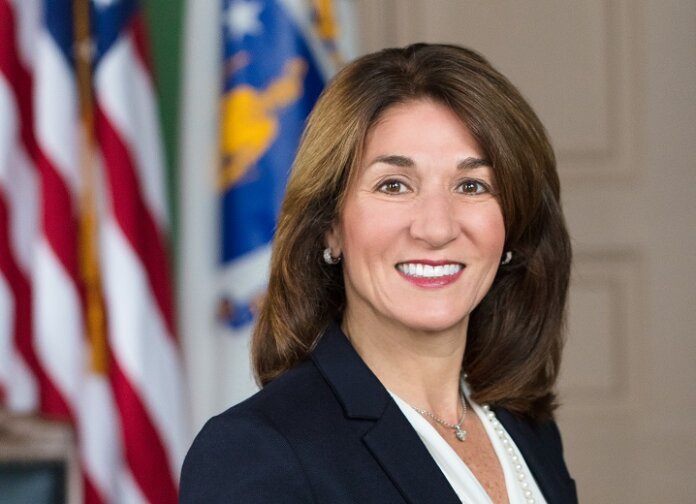Lt. Gov. Karen Polito, Energy and Environmental Affairs Secretary Kathleen Theoharides, and Massachusetts Clean Energy Center Interim CEO Jennifer Daloisio visited Greater New Bedford Vocational-Technical High School to meet with students in the marine technology, computer graphics and engineering programs this week, highlighting potential career pathways in the emerging offshore wind industry and participating in a demonstration of a new virtual reality offshore wind training program supported by the Baker-Polito administration.
The event was held as part of the administration’s celebration of Massachusetts STEM Week.
“Massachusetts continues to lead the way in developing new technologies and programs to prepare the workforce to serve the emerging offshore wind industry in the commonwealth,” states Gov. Charlie Baker. “Our plan to invest $750 million in a clean energy investment fund, along with these vital workforce training programs, will help unlock significant economic opportunities associated with offshore wind development and ensure that everyone in the commonwealth can benefit from the jobs that will be created now and in the future.”
The virtual reality training program is developed by VinciVR Inc., a startup headquartered in Boston. In 2020, the Massachusetts Clean Energy Center awarded VinciVR a $124,670 grant to develop two offshore wind training modules for Basic Technical Training-Installation and Slinger Signaler using virtual reality simulations, in partnership with offshore wind turbine manufacturer Siemens Gamesa Renewable Energy, with the intent to have the training modules Global Wind Organization-certified.
“Offshore wind presents a tremendous opportunity for students across the commonwealth to see themselves in STEM,” says Polito. “The cutting-edge virtual reality training program supported by our administration is an engaging way to get young people across the commonwealth interested in a career in offshore wind, while helping to advance our goal of building a diverse, inclusive, and equitable workforce.”
VinciVR’s newest program is specifically designed to introduce students and young people to offshore wind and the potential job opportunities that will be created by the development of this clean energy resource in Massachusetts. this rapidly growing field of employment. Additionally, MassCEC connected the company with the International Brotherhood of Electrical Workers (IBEW 223) in Taunton, where electrical apprentices have beta-tested Vinci’s virtual training modules. So far, the apprentices have been the most successful participants in Vinci’s VR training, with a 100% success rate, demonstrating talent and expertise of the commonwealth’s emerging, skilled workforce and its ability to meet the needs of the offshore wind industry.
“By fostering partnerships with young, innovative startup companies like VinciVR and established offshore wind industry leaders, the Baker-Polito administration is able to support new approaches to workforce development that expand access to opportunity for young people across the Commonwealth,” comments Theoharides. “Offshore wind offers students across the commonwealth – especially students in our vocational-technical schools – exciting new opportunities and career pathways, and new tools like virtual reality make critical training programs more engaging and accessible for the next generation of clean energy workers.”
Peyser focuses on the important role STEM education, and especially a virtual reality program, can play in training workers to prepare for the clean energy technology jobs. Achieving the state’s climate goals of net zero by 2050 will have to include workforce training investments, adds Daloisio.
“The climate crisis is very daunting, and the offshore wind industry in the U.S. faces a lot of hurdles spanning the logistics of establishing a strong, union-backed workforce to ensuring equity and environmental justice to disadvantaged communities,” comments VinciVR CEO Eagle Wu. “We have to do everything we can to inspire younger generations like mine to get involved and turn a crisis into an opportunity.”
Additionally, VinciVR is launching an offshore wind recruiting package aimed at engaging and exciting the next generation of industry experts. Vinci is currently in the process of converting its training simulations into interactive experiences aimed at educating high school, middle school and post-secondary school students about the scale and operations of renewable energy.
Image: Photo by Andrey Sharpilo on Unsplash




